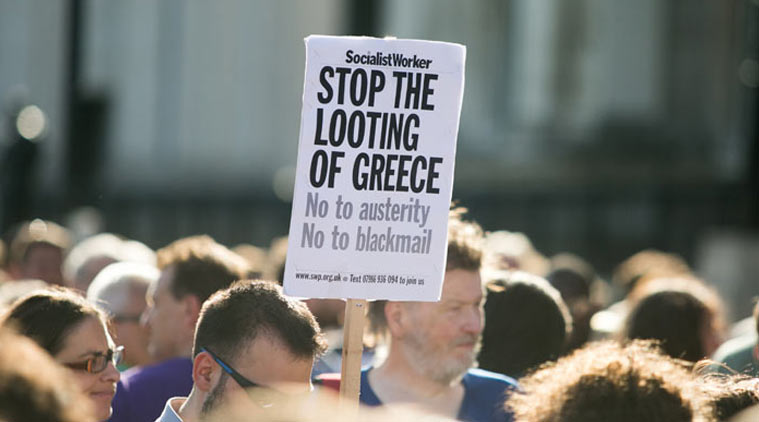 In the backdrop of a possible Greek exit from the European monetary union, the country will have to switch back to the drachma, the currency prevailing in Greece before the euro. (Source: AP)
In the backdrop of a possible Greek exit from the European monetary union, the country will have to switch back to the drachma, the currency prevailing in Greece before the euro. (Source: AP)
Devaluation essentially means officially pegging the value of a currency lower that what is prevalent vis-à-vis a reference foreign currency. It is normally undertaken by the monetary authority or the central bank of a country, but is generally backed by the government of the day. In the backdrop of a possible Greek exit from the European monetary union, the country will have to switch back to the drachma, the currency prevailing in Greece before the euro. Given its very high debt levels and a rapidly shrinking economy, the country will be forced to devalue its currency to be competitive at a time when the global economy is still powering down.
[related-post]

In India, the rupee was devalued by almost 65 per cent in 1966 when Indira Gandhi was Prime Minister — and again in 1991, when P V Narasimha Rao was at the helm. While the economy was almost closed until the 1970s, the 1991 devaluation was forced on India because it had virtually no foreign exchange reserves, so vital to import products, specifically oil, given its overwhelming dependence on the rest of the world. But then, the 20 per cent devaluation was followed up with a slew of reforms, which attracted huge foreign capital and shored up the rupee.
The rupee is fixed to a basket of currencies, and the Reserve Bank of India does not intervene in the foreign currency market except when it is volatile. India prefers to call this a “managed float” — meaning the country has a floating exchange rate like all developed economies, but still intervenes in a limited manner to manage large swings. A lower rupee helps exporters remain competitive in the global market, because foreigners can buy more using their dollars. The Indian rupee has, over the last year or more, depreciated against the dollar while strengthened against other currencies such as euro and yen. It is important to note that depreciation and devaluation are different; depreciation is a result of market movements, whereas devaluation is an official lowering of the value of a currency.

 In the backdrop of a possible Greek exit from the European monetary union, the country will have to switch back to the drachma, the currency prevailing in Greece before the euro. (Source: AP)
In the backdrop of a possible Greek exit from the European monetary union, the country will have to switch back to the drachma, the currency prevailing in Greece before the euro. (Source: AP)





































